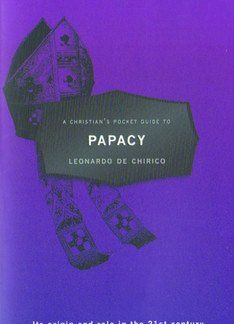With the Bishop of London giving approval to the ecumenical movement and rejoicing in closer ties with the Roman Catholic Church, this book is a must.
Not only does the said bishop give an unclear sound, but even some of a Reformed evangelical outlook paint a confused picture. A recently appointed moderator of a Scottish Presbyterian denomination has proudly commended a book written by Pope Benedict XVI, entitled Jesus of Nazareth. And the ‘Holy Father’ himself was welcomed by the same moderator as a fellow brother in Christ.
As the title would suggest, de Chirico’s book is a pocket introduction to the errors of the Roman Catholic Church. Much has been written about the theological errors of the papacy, yet many today would object to the old evangelical separation from Rome — after all, we share so much in common: we both believe in the Trinity; virgin birth; crucifixion, resurrection and deity of Christ; personality of the Holy Spirit; Lord’s Supper, baptism and more!
Yet herein lies the real danger. Scripture warns that the devil appears as an angel of light. Even in areas of agreement, all is not what it seems. Two vital examples of radical divergence concern Catholic and Protestant views on baptism and the Lord’s Supper (what the Roman Catholic Church calls the ‘Mass’).
Other questions addressed by this guide include: Who is the head of the church? Who is the ‘Vicar of Christ’? What did Jesus mean by ‘upon this rock I will build my church’? What role does the apostle Peter have in the church of Christ? Was Peter indeed the first pope? And that ever-vexing question, ‘Is the pope the antichrist?’
Christian unity and religious oneness are big issues today, especially with the church faced by Islamic threats and an aggressive secular culture. Yet uniting with error and falsehood is not the answer to this onslaught. It needs a return to a clear and robust defence of historical Christianity, as given, for example, by this little book.
Stephen Holland
Westhoughton



